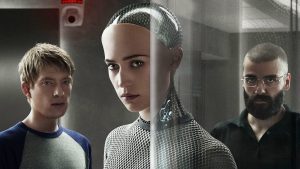Shadow of the Technology:
Alex Garland’s Ex Machina (2014) and Privacy
by İbrahim Eren Adalı

Ex Machina, a brilliant movie regarded as a remarkable example of the sci-fi genre, serves as an excellent ground to explore the pernicious effects of the rise of technology. The plot centers around Ava, an ultra-realistic humanoid robot constructed by Nathan, a wealthy genius programmer who owns a search engine company, and Caleb, a young computer coder. Nathan invites Caleb to his massive facility for a week to investigate Ava’s intelligence level test, also known as the Turing Test. It later appears that Ava has higher intelligence than even Caleb and Nathan. However, it turns out that Ava gained her consciousness through engines that track databases, phone cameras, and microphones, as well as search histories of the internet users. Ex Machina deeply explores how advanced technology may be used to violate the ethics of privacy protection in our modern world.
The atmosphere of the film is the perfect blend of dark and eerie. Ex Machina takes a deep dive into the issues around technology-related anxiety. One of the biggest twists in the movie related to this anxiety occurs at the end when Caleb finds out that Ava, the android, was never the subject of the experiment from the very beginning. It turns out that Ava is constructed based on Caleb’s porn search history on the internet. The primary purpose of the experiment is to determine whether Ava is intelligent enough to deceive Caleb into aiding her escape. She achieves her object successfully since Caleb develops feelings for her. Therefore, there is a strong connection between Ava’s manipulative futuristic technology and the current smart devices that have access to our camera, microphone, and database without our consent. One might even argue that the movie refers to the issue of online identity fraud. Nathan steals Caleb’s digital identity and invades his privacy. He even sabotages his romantic and sexual desires to exploit him ruthlessly. It stands as a great illustration of malicious virtual platforms or user agreements we sign blindly without reading the content on websites.
Interestingly enough, Nathan’s company’s name is Bluebook, a direct reference to Facebook. Therefore, the movie brings up controversial political problems and their relations with social media too. Today, it is impossible to ignore social media’s impact on national politics. In previous years, social media is used as a manipulation tool to change the outcome of elections. They basically collect the personal data of fifty million social media users without their knowledge and use it as a political advertisement to manipulate the voters. Then the debate started on how such misconduct distorts the ethics of the research and the right to privacy. Ava is the perfect reflection of the manipulative usage of the current technological advances and social media. Caleb serves as a symbol of social media users who were unconsciously included in the psychological experiment. Ex Machina warns us by showing how human rights and the right to privacy may come under attack through “manipulative” emerging technologies.

